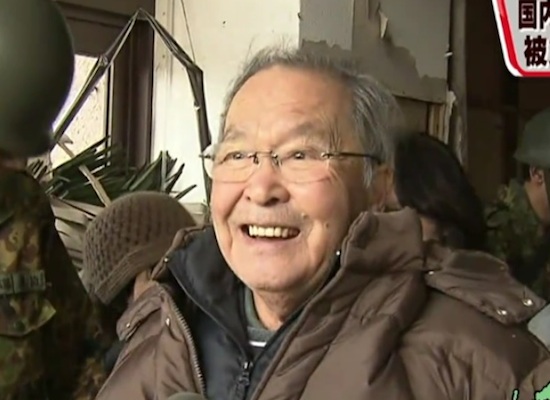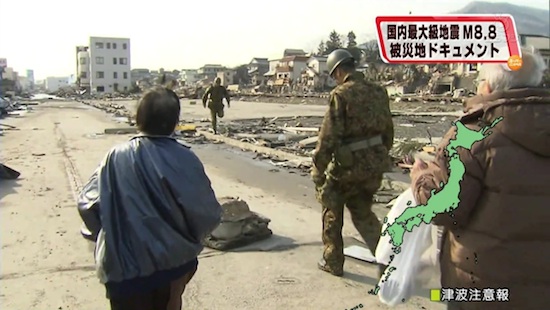This Is Japan

One thing to remember is that when you read the stories about “panic” and how it is “sweeping over” Tokyo and Japan, these reports are by western media outlets, and is usually speaking about foreign visitors they find leaving from the airports. That’s not the Japanese you will find on the streets of Tokyo, or any city in Japan. And it is not the Japanese you will meet in Tohoku. Yes, there is sadness and misery; this is natural. But not panic.
You want to see how real Japanese people are reacting? Here’s one fantastic example–a 72-year-old man who had been stranded with family on the 3rd floor of his house, in one of the towns devastated by the tsunami in Tohoku. As he is rescued by self-defense force personnel, he steps out onto the street, his whole town washed away before him. But he’s got a big smile on his face. “I’m all right!” (大丈夫です!) he announces to a reporter gaily. “I experienced the Chilean tsunami (a similar wave that hit Japan in 1960), so I’m OK!” (チレ津波も体験しているから、大丈夫です!)
As he steps out onto the street with his family and dog, he says with great vigor and spirit, and in a wonderful Tohoku accent, “Let’s rebuild again!” (また再建しましょう!)
Here’s the video:
Indeed, this is not the first time for this in Japan. A giant earthquake hit the Kanto region in 1923. Japan was flattened in the wake of WWII, and spent more than a decade recovering, but that they did. In 1960, the Chilean quake sent a similar tsunami to the east coast of Japan–the one the old man is referring to. Japan has been hit, again and again in the past. And recovered every time. The rest of us overlook this.
Japan will rebuild. It will recover.

The city of Onagawa, 1960, being hit by the Chilean tsunami.
Onagawa was the closest city to last Friday’s quake.
This article from The Globe and Mail, forwarded by Steve, details the people’s state of mind fairly well:
In another country, there would be panic, rage and shouts aimed at the government and the sky. But not Japan. Despite the multiple catastrophes that have simultaneously hit this archipelago, a very Japanese calm and politesse has held back the chaos.
As one catastrophe piled on top of another, a very Japanese deference to authority emerged, as well as a national desire to see civility prevail, no matter the circumstances.
Along the crowded highway that connects Tokyo with the tsunami-battered north, people waited in orderly fuel lines hundreds of cars long without any shouting, honking or cutting in line. In the worst-hit city of Sendai, streets were shattered and cars were flung on top of homes by the force of the tsunami, but in three days there was not a single report of looting.
And here in Koriyama, the city closest to the escalating crisis at the Fukushima nuclear plant, residents queued around the block for drinking water being distributed from trucks parked outside a local gymnasium. When an official announced over a loudspeaker that supplies were running low and dozens of families would have to go home without, the line quickly and quietly dispersed.
Most notably, no one panicked and fled south even as the three reactors of the Fukushima plant continued their weekend-long flirtation with disaster. The French and U.S. governments advised their citizens to leave not just the region around the reactor, but also Tokyo 260 kilometres to the south, but most Japanese who live close Fukushima seemed in no hurry to flee.
There is a Japanese word for it: gaman. To persevere.
This quote from Tennyson’s Ulysses comes to mind:
Though much is taken, much abides; and though
We are not now that strength which in old days
Moved earth and heaven, that which we are, we are—
One equal temper of heroic hearts,
Made weak by time and fate, but strong in will
To strive, to seek, to find, and not to yield.


Excellent post. I am stealing that Tennyson quote.
I am amazed my life
beaten to rust
love survived
Luis,
Well done. I copied this to my colleagues abroad who probably think I’m crazy for not leaving already. Also, I came across an article this morning in The Australian; It’s in the same vein:
‘Body blows to test Japanese spirit’ http://bit.ly/f0Lhk0
-Jim
While I agree that the Western media is exaggerating the impact a tad in order to sell papers, I still think it would be sensible to cancel all school classes and activities until the radiation issue can be contained. It may be a small amount of radiation, but it is radiation nonetheless, and it is difficult to measure accurately once it’s in the air.
The elderly man coming out after days trapped in his home is an inspiration to others. He represents the determination of the Japanese people to look on the bright side, even in the face of peril.
If it had been me, however, I think my feeling after this event would have been different.
Questions: “Daijoubu?
My answer: “Daijoubu ja Naijoubu!”